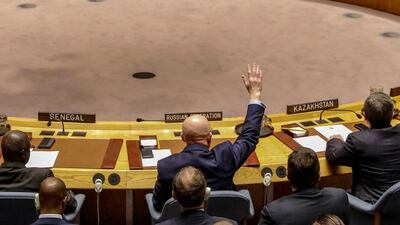The death of more than 500 people in eastern Ghouta has prompted a unanimous vote by the UN Security Council in favour of a 30-day ceasefire to allow medical evacuations and aid delivery.
Over 20 resolutions have been passed since the start of the Syrian war in 2011 and while most of them have been unanimous, Russia has used its power of veto to stop 11 of them from going through.
Russia - often along with China - has made use of its permanent seat in the Security Council to protect President Bashar Al Assad's interests.
Last week Moscow threatened to veto a proposal for a ceasefire in Syria if the sponsors pushed their draft to a vote.
But even unanimous resolutions have failed to be upheld by key players on the ground. The last major ceasefire negotiated with Russia, in eastern Aleppo in late 2016, collapsed on the day it was due to take effect.
More than 340,000 people have been killed and millions driven from their homes in a war that is soon to enter its eighth year with no solution in sight.
The first time a Security Council resolution failed to pass came just six months after the start of the war in October 2011.
The council drafted a statement “expressing grave concern at the situation in Syria.” The only solution to the crisis was "through an inclusive and Syrian-led political process with the aim of effectively addressing the legitimate aspirations and concerns of the population." The draft resolution was vetoed by Russia and China.
In order to be passed, a resolution needs nine votes in favour and no vetoes by any one of the five permanent members - the US, France, Russia, China and the UK.
Last November Moscow used its veto to block the resumption of a UN investigation into the use of chemical weapons by Mr Assad's forces.
Additionally, Russia and china also blocked a draft resolution in February that called for sanctions on the parties involved in the chemical weapons investigation, despite passing a resolution in September 2013 that called for the verification and destruction of Syria's chemical weapons stockpile.
A joint Investigation Mechanism (JIM) was created in 2015 to identify who should be held responsible for chemical attacks. Russia has accused JIM of bias and argues that major changes are needed to be put in place for it to continue.
In the wake of the gas attack on Khan Sheikhoun in Idlib province last April, where more than 80 people were killed, a draft resolution was drawn up to condemn the attack and call for an international investigation into the perpetrators.
Russia used its veto power while China abstained.
_______________
Read more:
Syrian regime strikes in rebel enclave despite ceasefire call


